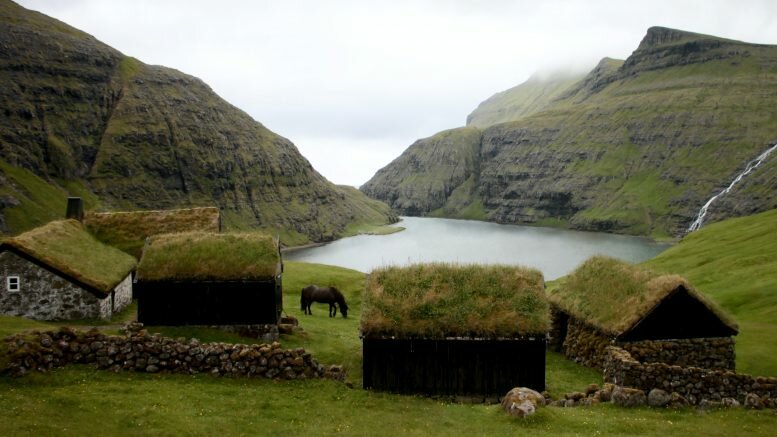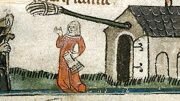For a long time, scientists believed that the Vikings were the first people to settle the Faroe Islands. However, recent research indicates otherwise.
Based on archeological evidence, the long-standing consensus among scientists was that the Faroe Islands, located between Iceland, Norway, and the British Isles, were settled by Norse explorers, The Viking Herald reports.
However, in a study published in the journal Communications Earth & Environment, researchers put forward unequivocal evidence, based on the analysis of ancient feces, that the Vikings were not, in fact, the first people to settle the Faroe Islands.
Researchers used an advanced technique to date the oldest settlement to 500 CE, roughly 300 years before the Norse raiders developed the sailing technology that would help them fuel their maritime expansion.
Human presence
Lorelei Curtin of American Lamont-Doherty Earth Observatory, the lead author of the study, and colleagues collected the evidence from sediment cores taken from the Eiðisvatn catchment, home to the remains of an old Norse summer farm settlement called Argisbrekka.
Based on these sediment cores, researchers identified the presence of lipid molecules, also called fecal biomarkers, that come from feces.
The Argisbrekka fecal biomarkers have a distinct signature originating from the digestive tracts of sheep. As all mammals of the Islands were initially introduced there by humans, traces of sheep poo are a clear indicator of human presence.
The researchers dated the sediments in which the markers were identified, which enabled them to date the arrival of sheep to the Islands several centuries before what was previously believed.
“The initial appearance of sheep DNA and increased fecal biomarkers predates the first documented usage of the Argisbrekka site by the Norse by approximately 300 years,” the team noted.
New research techniques
The researchers also confirmed the earlier settlement date through the use of advanced DNA sequencing technology, which helped them put together a profile of the DNA in the sediment cores.
The sampling detected increasing concentrations of both sheep and grass DNA coinciding with the disappearance of woody plants.
This change in vegetation was previously attributed to climate change in the late Holocene, but now it seems that widespread grazing was the dominant driver of landscape transition from shrublands to grasslands and peatlands in the Faroe Islands, according to the study.
These new findings validate certain doubts related to the Norse-settlement narrative, which was primarily based on the dating of archaeological structures.
The earliest structures on the Islands date between 800 and 900 CE, consistent with the timing of the Norse expansion to Iceland, Greenland, and North America.
New evidence
“While the nature of archaeological records causes them to be temporally fragmentary, sedimentary archives provide continuous records of the environmental history of a landscape,” the researchers accentuated.
These results have opened up the discussion regarding pre-existing lines of evidence that have cast doubt on the established narrative and timeline.
Multiple place names in the Faroe Islands derive from Celtic words, and a number of Celtic grave markings have been identified across the Faroes. Some of the most convincing evidence can be found in the genetics of modern Faroese people.
The Cosmos writes that there is “a strong asymmetry between paternal and maternal ancestry, with the paternal lineage dominantly Scandinavian, while the maternal lineage is primarily from the British Isles.”
Although this suggests an existing population, none of the aforementioned evidence is directly conclusive.
“By 800 CE, the Vikings were already active in the British Isles… They were already influenced by Celtic culture and could have brought wives from the British Isles to the Faroe Islands,” the researchers pointed out.
The mystery of the first inhabitants
Thus, the current research concretely establishes the existence of human presence on the Faroe Islands long before Norse explorers and raiders took up sailing – somewhere between 750 and 820 CE – which leads to the conclusion that it is unlikely that the first settlers of the Faroe Islands were Vikings.
But if they weren’t Vikings, who were they?
At the moment, that remains a mystery. Genetic profiles, the etymology of place names, and grave markings point toward a Celtic population. Still, direct DNA evidence can’t confirm these indications.
Source: The Viking Herald / #Norway Today / #NorwayTodayTravel
Do you have a news tip for Norway Today? We want to hear it. Get in touch at [email protected]






This parallels Iceland: male DNA Viking and female DNA Celtic/Irish.
So was Iceland too inhabited centuries before the Viking age?
I assume this was also the case for the Shetland Islands, where my own Viking ancestors come from.
Unfortunately for those scientists we already knew that vikings were not the first here it was some Irish munks that arrived first they lived here for a few hundreds of years before the vikings came but what we don’t know is what happened to them did they survive or did the vikings get them all